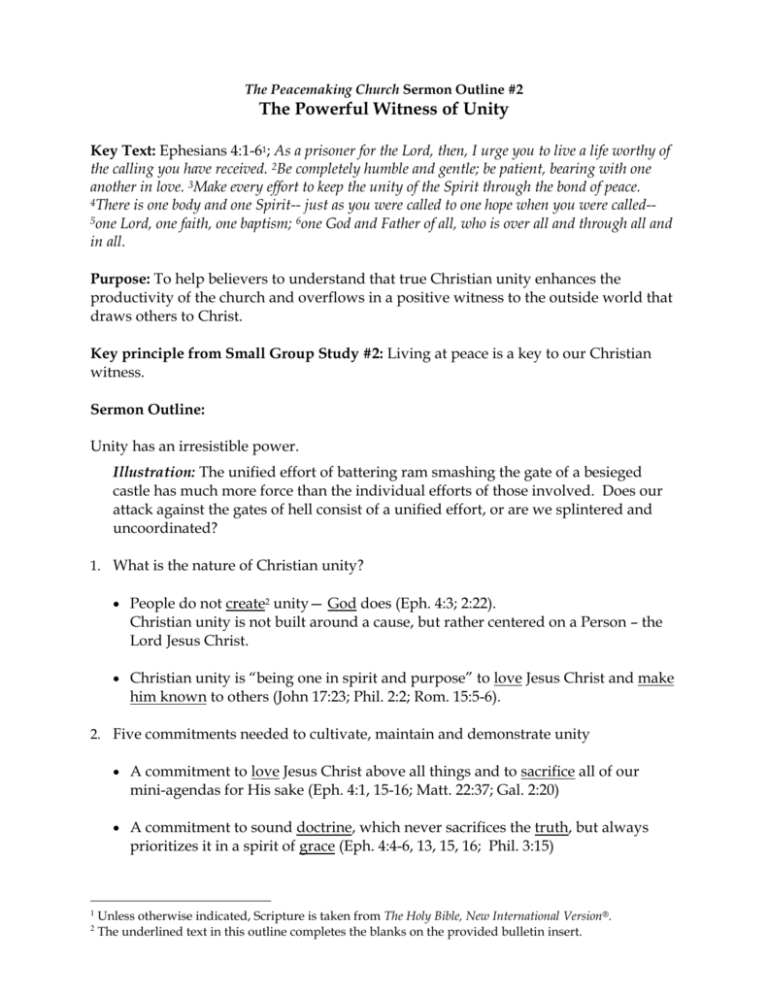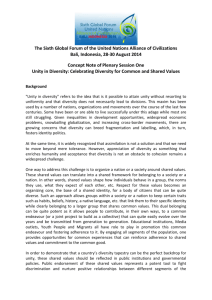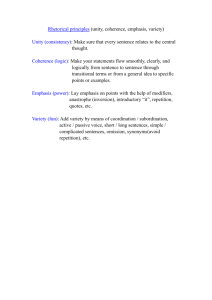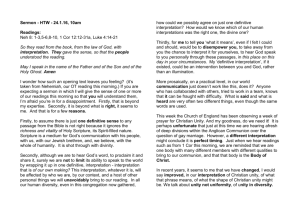The Powerful Witness of Unity
advertisement

The Peacemaking Church Sermon Outline #2 The Powerful Witness of Unity Key Text: Ephesians 4:1-61; As a prisoner for the Lord, then, I urge you to live a life worthy of the calling you have received. 2Be completely humble and gentle; be patient, bearing with one another in love. 3Make every effort to keep the unity of the Spirit through the bond of peace. 4There is one body and one Spirit-- just as you were called to one hope when you were called-5one Lord, one faith, one baptism; 6one God and Father of all, who is over all and through all and in all. Purpose: To help believers to understand that true Christian unity enhances the productivity of the church and overflows in a positive witness to the outside world that draws others to Christ. Key principle from Small Group Study #2: Living at peace is a key to our Christian witness. Sermon Outline: Unity has an irresistible power. Illustration: The unified effort of battering ram smashing the gate of a besieged castle has much more force than the individual efforts of those involved. Does our attack against the gates of hell consist of a unified effort, or are we splintered and uncoordinated? 1. What is the nature of Christian unity? People do not create2 unity— God does (Eph. 4:3; 2:22). Christian unity is not built around a cause, but rather centered on a Person – the Lord Jesus Christ. Christian unity is “being one in spirit and purpose” to love Jesus Christ and make him known to others (John 17:23; Phil. 2:2; Rom. 15:5-6). 2. Five commitments needed to cultivate, maintain and demonstrate unity A commitment to love Jesus Christ above all things and to sacrifice all of our mini-agendas for His sake (Eph. 4:1, 15-16; Matt. 22:37; Gal. 2:20) A commitment to sound doctrine, which never sacrifices the truth, but always prioritizes it in a spirit of grace (Eph. 4:4-6, 13, 15, 16; Phil. 3:15) 1 2 Unless otherwise indicated, Scripture is taken from The Holy Bible, New International Version®. The underlined text in this outline completes the blanks on the provided bulletin insert. A commitment to develop Christ-like character, especially humility and submission (Eph. 4:2; Rom. 12:3; Phil. 2:3-4; 1 Pet. 3:8) Illustration: Two individuals who strongly opposed each other’s view later end up arguing in favor of the other person’s view. When our focus moves from self to service of others, this is a sign that we are growing in our Christ-like character. A commitment to respect and pursue God-given diversity and accept one another as Christ has accepted us (Eph. 4:11; Rom. 12:3-8; 1 Cor. 12:12-27; Col. 3:11; Rom. 15:7) Illustration: Unity is not the same as uniformity. The church at its best should be like an orchestra, with many different instruments blending together under one conductor to play complementary parts in one glorious composition. A commitment to strive earnestly and prayerfully to pursue peace, resolve conflict, and preserve relationships despite personal differences (Eph. 4:3; Prov. 19:11; Luke 6:27-28; Rom. 12:18; Gal. 6:1) 3. The evidence and fruit of unity A harmony of shared lives, with people regularly meeting, eating, praying, worshiping, and reaching decisions together (Acts. 1:14; 2:46; Rom. 12:16; 1 Pet. 3:8) No worldly discrimination based on race, gender, age, or economic status (Gal. 3:26-29) A commitment to seek genuine understanding and agreement rather than an imposed uniformity (Phil. 2:1-4) People feel a freedom to respectfully disagree with one another (Phil. 3:15) Work productively toward common kingdom goals and invest our spiritual and material resources far more effectively (Acts 4:32-37) Durable relationships (Eph. 5:25; Col. 3:12-15) Enhance our witness for Christ (John 17:23; 13:34-35) Conclusion: True Christian unity can provide a powerful and appealing witness to the world. Challenge: What will you do today, by God’s grace, to cultivate, maintain, and demonstrate unity in your marriage, family, workplace, or here at church? 2









